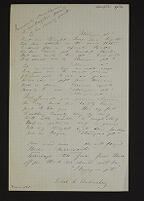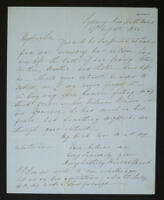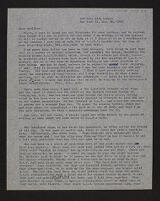(Labelled, ‘1822 Nov. 29 | Byron (Lord) | Given by Lt-Col. & Mrs Charles F. Call | (née Trelawney [sic]) | 10 July 1912’.)
Foreign Office, S.W.1.—Presents to Trinity College a bill of lading for the shipping of Lord Byron’s furniture, discovered among the archives of the British Consul at Venice.
—————
Transcript
FOREIGN OFFICE, S.W.1.
21st July, 1932.
L 3720/43/402.
My dear Gow,
Our Consul at Venice has recently been engaged in sorting out old archives, and has been sending home to us a mass of expired passports, ships’ articles or crew lists, and a collection of copies of Bills of Lading dated between 1817 and 1823.
Among these latter there is one of some historical interest, as it covers the furniture sent by Byron from Venice to Ravenna in January, 1820. I think he had himself returned to Ravenna shortly before Christmas, 1819, and had these things sent after him.
I have been authorised to dispose this document where it will be appreciated and preserved with care, and after considering the British Museum, Harrow and Trinity, I think that you are the most suitable people to {1} have it, if you want it.
I enclose a translation of it so that you may see its nature {3}. I think the last item the “small child’s bed” is rather pathetic as it doubtless belonged to little Allegra, who had been ill just before they left Venice.
I do not know whether you will find it necessary to consult anybody else before accepting this offer. I presume your Council does not meet in the long vacation, nor your Library Committee, but you can doubtless speak to the Master or Vice-Master about it, and if you tell me that you would like it, I will send it by registered post or bring it with me some week-end when I come to Cambridge.
Yours ever,
Stephen Gaselee
Andrew Gow, Esq. {2}
I feel that if it went to Harrow it might set the boys asking “But why did the poet go from Venice to Ravenna?”
—————
Typed, except the signature and the postscript.
{1} Typed as a catchword at the foot of the first page and repeated at the beginning of the next.
{2} Typed at the foot of the first page.
{3} It is unclear whether the translation accompanied the bill from Venice, or whether it was made in England by Gaselee himself or someone else.
(It is unclear whether this accompanied the bill of lading from Venice, or whether it was made in England by Gaselee himself or someone else.)
—————
Transcript
Venice, January 26th, 1820.
Embarked, in the name of God and under good auspices, one {1} and for all in this port of Venice by Mr. Richard Belgrave Hoppner, His Britannic Majesty’s Consul for account of Signor Milord Bajron, in the hold of the sailing ship named Divina Provvidenza, owner Francesco Ceolin, Austrian, to convey and consign in this present voyage, to the said Signor Milord Bajron the undermentioned and numbered goods, dry, entire, and well conditioned and of the numbers stated: and so the said Master promises to consign them on his safe arrival; and as freight there shall be paid to him in all eighteen Roman crowns, Crowns 18, and in proof thereof this, together with other similar (copies) shall be signed by the said Master, and if he shall be unable to write, a third person shall write for him, and only drawn up, the others being of no value.
No. 4 Mattresses, with 3 pillows and bolster.
” 1 Small padded bed cover.
(a) 2 Empty mattress cases.
(b) 4 Comodes—packed in matting
2 Footstools
1 Basket with various effects, covered in cloth.
1 Valise.
1 Bundle containing a bracket and other effects packed in matting.
1 Dining-room table.
1 Small table.
1 Filter.
4 Cases of printed books.
1 Case containing a plaster Statue.
(c) 1 Sofa of cherry wood.
4 Cushions for the above.
(d) 16 Small walnut chairs.
6 Small straw-seated arm chairs.
1 Caldron containing various effects.
2 Small wooden dog-kennels.
1 Bath tub.
(e) 1 Package containing a double bed and a small child’s bed, taken to pieces.
Lodovico Barbaglia,
for the Master Franco Ceolin as witness.
Notes:—
(a). It was usual at that time to stuff mattress cases with straw—hence the word “Pagliazzo”—(paglia—straw)—presumably the servants’ mattresses.
(b). Como stiorati—the latter word is probably derived from stiora or mat, and possibly they were cov-ered in matting. “Stiorati” a term which is used locally for “inlaid”.
(c). Sofa di Cevesar—this word is evidently Cereser—or the local dialect for cherrywood.
(d). “Careghe”, diminutive “Careghino”—Venetian for a chair.
(e). “Cocchietta”—mispelt† for “cocetta”—double bed. “Putello”—Venetian for child.
—————
1 single sheet.
{1} A slip for ‘once’?
{2} ‘aj’ possibly typed over other letters.
† Sic.
54 Cours Napoléon, Ajaccio, Corse - In the letter of 30 October, he is resigned to the fact that they will find a collaborator for Sir James and have their own requirements; refers to the reception of Lilly Frazer’s books at the local school; writes of Madeleine, recovering from typhoid fever, and her brother, who has just received a doctorate in law. In the letter of 29 Nov. he has agreed to organise the surveys for Varagnac for the Encyclopedie Françoise. In the letter of 12 Nov., he is glad to hear they will be at their club until the end of the year; thinks the translation by Madame Roth is ingenious, but it is hard to match the quality of Sir James’ verse. The achievement of 'The Fear of the Dead' is difficult if one cannot reread the documentation and though Frazer has a good memory he should have someone help who can find what he needs and read it to him. All three letters contain news of Martine [Giamarchi, a great niece].
54 Cours Napoléon, Ajaccio, Corse - He is pleased things are going well for her; is working with maps of Corsica, and some have Dutch text he cannot read (Jan. 19); he thanks her for various things she has sent in the post: the 'Times', with its coverage of Edward VIII (Jan. 28), an issue of 'Punch', with an image [?] of Canon [Alexander] Nairne at Windsor (3 Feb.) and pictures for Martine [Giamarchi]. He has sent a parcel of responses to the questionnaire to Varagnac; is happy they had a good evening with Wickham Steed (16 Feb.).
Belmont. - Death of Milnes' father [Richard Slater Milnes]; choice of subject for Cambridge Latin Declamation Prize; Milnes should have the highest English Declamation Prize; envies Milnes' trip to Edinburgh; hopes he will remain at Cambridge until Christmas; right choice of college.
Bolsover Castle. - Values poems as remembrance of Milnes' visit to Bolsover; enchanting visions of Egypt.
Includes: Correspondence with Anne Nill (Mrs. Voynich's companion) with an account of her death.
Correspondence with Winifred Gaye, 1961-69 (`who thought not legally adopted by me has always been considered by me as a daughter' according to Mrs. Voynich's Will).
Correspondence re Mrs. Voynich's estate and portrait.
Trin: Coll: - Gives his 'critical' comments of WW's treatise on dynamics. He considers WW's enunciation of the laws of motion 'very far preferable to any other that I have seen'. GA emphasises the importance of attaching the same meaning to the word: 'It matters not whether there is at all such a thing as velocity in the world, provided we mathematicians know what we mean by it, and always attach the same meaning to the word. This latter is essential to logical reasoning: and in a science which is not founded on hypothesis but on experiments it is of the greatest consequence that the same word shall signify the same thing in the reports of the experiments and in the mathematical properties founded on them'. Drawing upon Atwood's machine and the philosophy of Locke, GA gives his definition of velocity: 'It is measured by causing the weights (as far as is in our power) to combine during a unit of time in the same rate of motion or at the time for which we desire to find the velocity, and the space thus described is called the velocity. To me the limit of ds/dt is rather difficult to get, but I find no difficulty in conceiving a body to continue to move with the same degree of motion which it has at any time (This perhaps appears absurd - but Locke says that we can comprehend relations between two things without having a clear idea of either)'. GA gives various mathematical corrections to WW's work: 'when I see Mr Whewell led astray in the use of the differential calculus by obscure principles and a bad notation I cannot help wishing that better were substituted'.
GA does not think WW's letter to David Brewster 'at all savage': 'If I had any discussion with Brewster on these points I would certainly hit him about his bad information and his influence in acting on it. The revenues of professorships &c is one point already reproached - another is the character of the professors "Whewell, Airy & Hamilton" the only true experimenters - Does not [James?] Cumming do more than all? And did [Sir W. R. ?] Hamilton since he drew vital air ever make or meditate an experiment or trouble himself about other peoples?...I wish Babbage's non-lecturing could somehow be lugged into this controversy'.
Royal Observatory Greenwich - The clock for the Northumberland telescope is nearly finished. Could WW get [James] Challis to send to [William] Simms or GA 'the breadth of the hole that is left by the side of the south pier of the polar axis for the clock weights to drop into; as that will determine the construction of our weights'. Could WW ask the President of the Council of the Cambridge Philosophical Society, whether they would present to the library of the Royal Observatory a copy of the Transactions of the Society. This will help bind the links between the Observatory and Cambridge.
Royal Observatory Greenwich - In response to Colonel Everest's pamphlet, GA wrote to the East India Company to inquire into the nature of Major Jervis's appointment. They wrote back stating that it was for the entire management of the India Survey: 'There is a charming appointment for you! Given a furious fellow like Everest on one side, and a not-over-wise one like Jervis on the other, I do not think that a better appointment could have been devised for the purpose of setting them together by the ears and dragging some innocent persons into the quarrel'.
Royal Observatory Greenwich - George Peacock has advised GA to apply to WW for names of weights and measures: 'I want a good name for 1/1000 part of an acre, or 1/100 of a square [chair?], or a square of 2 1/5 yards each side'.
Royal Observatory Greenwich - GA had intended to be in Suffolk on Tuesday but Humboldt and the King of Prussia are expected to arrive in the Thames today, and Humboldt will probably want to see the Royal Observatory - 'I should much like to shew it to him'.
Royal Observatory Greenwich - GA sends WW the first copy of his Tides and Waves: 'I have hit your theory pretty hard, but not so hard I trust as to hurt you'.
Royal Observatory Greenwich - GA fully understands why WW should be so much attached to his own theory on tides. GA strongly disagrees with WW 'that a fluid always tends to the condition of equilibrium and that this can be made in any way the base of a theory of motion. You would by this treat the theory of common waves (for instance) as that of water having a horizontal surface, and thus annihilate the waves altogether. Indeed I am rather surprised at this doctrine in general. When you come to particular cases, the inconsistency is remarkable. Perhaps the most curious of all the results of Laplaces's theory (I mean of course with the unnatural assumption of uniform depth and no dry land) is that of the non-existence of diurnal tides; and this stands irreconcilable with your equilibrium deduction... The cases to which it will apply may be so exceedingly restricted as to be practically useless; (e.g. Laplace's uniform depth, or my canals); nevertheless the theory is so far right: the equilibrium theory could not be right under any restriction...When you say that Laplace's theory gives us no light which the equil. theory had not given before, it seems to me that there is a moral perversion; you think that success founded on false principles is at least as good as failure founded on true principles which are imperfect (in extent, not in truth). I must protest against such a judgement in toto'. GA boils down WW's promotion of the equilibrium theory to the adverse effects WW thinks Laplace's theory would have on Cambridge students: 'I am free to say that the tone of my writings has been given by my vexation at seeing that you in every mathematical case and Lubbock in every case refer solely to the equilibrium theory'. GA does not knock cotidal lines - 'they are the greatest advance yet made in systematically representing the observations of ocean tides, but I think them inapplicable in some cases: and especially when the well marked series of waves interfere'. GA 'should be glad to lead on some attention to the theory of canal-waves with the conditions applicable to real rivers. First, I do not think that cotidal lines or mean levels can be made accurate till this is done, secondly, theory and observation can be compared to a very great extent here'. They (GA and Richarda Airy) went to see a cliff blown down at Dover organised by the engineer, Cubitt. The Herschels also went [see The Illustrated London News, 4 February 1843].
Royal Observatory Greenwich - WW is in Augustus De Morgan's 'collection of Authorities for the History of Science...in one of the early pages'. GA has had a large amount of observations made around Ireland (twenty-eight stations): 'Of course the reduction in the way in which I wish to reduce them will be a formidable work'. GA gives Cubitt's rule for blowing down chalk [see GA to WW, 24 February 1843]. WW is not attaching the names of 'Clairaut, D. Besneulli, &c...to the proper part of the subject. The equilibrium-theory as a statical theory of quiescent fluid, is very good (the proof of elliptic form &c being excellent, though the mere combination of effects of two bodies and the laws of the compound result are very simple). And I do not call the theory contemptible in itself, but as applied to the tides'. Abstractly the equilibrium theory is very good while Laplaces's is only admissable. As applied the equilibrium theory is absurd and Laplace's theory is very imperfect.: 'As to your opinion that Laplace's theory is not in the right direction because it does not at once give limits in longitude, I think that you have not sufficiently considered the order in which all results founded on differential equations proceed'. 'As to the combination of equilibrium theory with that of waves, I repudiate it absolutely... The failure of Laplace's on wave theory is merely one of mathematics and will, I hope, be conquered in time'.
Royal Observatory Greenwich - GA has been ill with a fever as have, it seems, most people in his neighbourhood. He encloses a copy of the Royal Astronomical Society's yearly report, and wants him to read his speech on delivering a medal to Captain Smyth [William Smyth]: 'You will perceive that it was made under rather delicate circumstances'.
Flamsteed House, Greenwich -Thanks WW for the dedication in his book on education [Of a Liberal Education in General, and with Particular Reference to the Leading Studies of the University of Cambridge, 1845].
Royal Observatory Greenwich - Richarda Airy has given birth to a boy.
Flamsteed House, Greenwich - An American gentleman, Mr Gould, has been 'working as amateur in the Observatory' and is coming to Cambridge: 'He is a well informed and well mannered young man'. GA has given him a letter of introduction but has told him not to use it to seek WW out in private but only if they meet in public.
Royal Observatory Greenwich - GA invites WW to dine with the Astronomical Club at the Piazza Coffee House at 5.30 on Friday, followed by a meeting at Somerset House where GA will 'expound the continuation of the History of Neptune (more strange than the beginning), and the theory of Hansen's new inequalities a la mode de "Gravitation"?'
Royal Observatory Greenwich - GA sends WW a melody he wrote in 1826. GA has 'lately been into Ireland to try Lord Rosse's [William Parsons, 3rd Earl of Rosse] telescope; and on my return I came (but did not try) Lassell's [William Lassell]. Lord Rosse's telescope is not finished: "much has been done, but much remains to do". I can conceive that it will be necessary to alter entirely the mounting of the mirror. If you are in London on Friday November 10, you may at the R. Astronomical Society hear an explanation of some of the principal differences between L. Rosse and Lassell, and of some of the principal absolute methods of L. Rosse'. Could WW attend a meeting of the Board of Visitors on December 1 or 2: 'We must decide something about the objects and scale of our Magnetic Establishment, and I wish that you as physician would think of it'.
Royal Observatory Greenwich - GA needs the reference 'to the first establishment of the simultaneity of magnetic disturbances, and to the book in which the first publication of it is to be found'.
Royal Observatory Greenwich - GA has been presented with a great correspondence on the observation of tides, involving at least twelve stations selected between Aden and Cape Comorin: 'But how long observations were to be made, at what periods of year, with what meteorological observations these were to be connected, how long and under what regulations the latter were to be made, I cannot make out'. GA thinks 'the indication of the nature of the observations' came from WW - 'if you could rake up any recollection of the proposed plan...I should be glad to have it. It is partly necessary to guide me in answers respecting the choice and expense of instruments'.
Royal Observatory Greenwich - Ransome and May acknowledge receipt of WW's letter advising payment for the paper punch [see GA to WW, 10 April 1850]. 'I understand that Lord John's announcement of the University Inquiry Commission took all parties by surprise. I do not know any thing more about it; but I conceive that it is a thing about which nobody in Cambridge needs to be alarmed or annoyed. I am convinced that Cambridge generally will come out of it; and specially that Trin: Col: would be a gainer...as far as I can gather, it is principally Oxford against which the commission is directed'.
Inverness - Regarding WW's question concerning fringes, 'I really can say nothing about them without seeing them. The dust-fringes and vapour-fringes have always mystified me a little. The others I have no doubt will come out as easily as becomes matters which usually have some very unmanageable geometry with very easy physics. But to tell the truth I do not know precisely how either set is formed'. Otto Struve is on his way to Lassell [William Lassell] at Liverpool and Lord Rosse at Parsonstown to see telescopes.
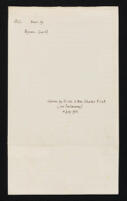
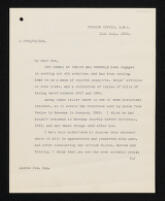
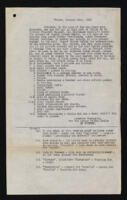
![Three letters from 'Jack' [François Ceccaldi] to 'Flaminica' [Lady Frazer]](/uploads/r/trinity-college-library/0/2/c/02c9947c571bf3852520e326fc5b7cf2f3ece534c09b21c148330f6737cfa8d4/FRAZ.32.107-109_thumb.jpg)
![Four letters from 'Jack' [François Ceccaldi] to 'Flaminica' [Lady Frazer]](/uploads/r/trinity-college-library/4/3/d/43dfef9788587e1c732632bff25324812506f4653bf68d6db85861c13e0cfc2c/FRAZ.32.110-114_thumb.jpg)
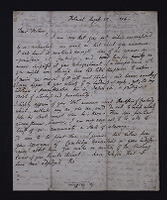

![Letter from M. D[arley?] to Hon. Millicent Julia Livingstone](/uploads/r/trinity-college-library/e/d/7/ed75c23b72f6620c28baf583175a0882e87ee9bb1affca009254888b8a380f52/HOUG.14.262_thumb.jpg)
